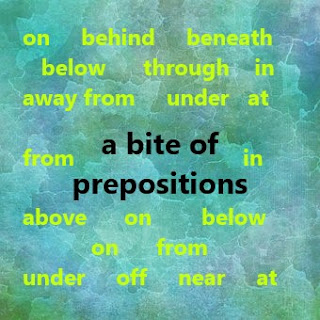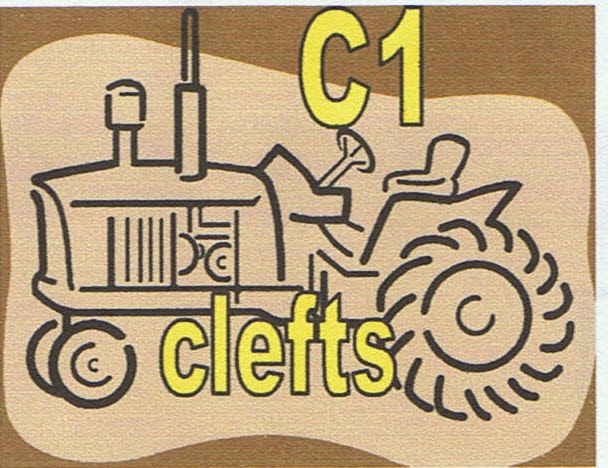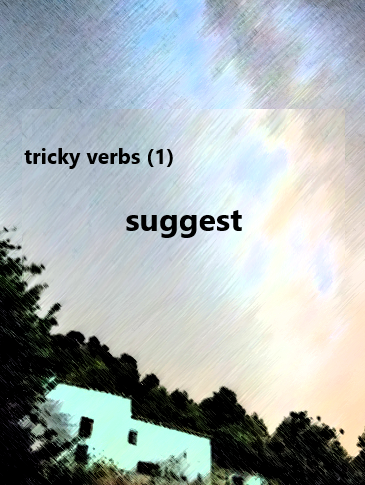a bite of prepositions
POSITION PREPOSITIONS
English
prepositions are famous for being difficult. In fact, they are, but prepositions are
difficult in all languages. The reason is that they are linking words and they
have several meanings. Their use, in any case, is not completely capricious,
and if it is, we’ll find the same in other languages. Students of English, for
example, complain about “somebody being on the phone”, but we must remember
that in Spanish “alguien está al teléphono” must sound terrible
to an English speaker. In this particular case, English favours a preposition that
takes into account position on a surface, while Spanish favours
one that points at the location of something or somebody (meaning 7 in in the
RAE dictionary –Real Academia Española de la Lengua). So far, there is no
problem. The problem comes when the prepositions have other meanings. For
instance, in Spanish “a” is also used to show direction or
destination, which implies a verb of movement and would be equivalent to
English preposition “to”.
Our intention
here is to reduce the meaning of prepositions to those of place following A
Grammar of Contemporary English by Randolf Quirk et al. And from these
meanings of place try to explain other meanings (time, for instance) in a
logical way. Of course we are not to deal with prepositional verbs or
collocations.
This Monday let
us concentrate on prepositions of position, which are:
at – on – in used when something is in close relation with something else
and
away from – off
– out of used when something is not in close relation
with something else.
Notice, very
important, that these are position preposition, which means they should not be used with
verbs of movements from/towards (for instance “go”) but verbs that show a
stable position of somebody /something in relation to something else. For
example, you go to the birthday party (not go
at* the party) but you are at the birthday party
and you drink at the birthday party and you
dance at birthday the party and you can even make a fool of yourself at the birthday party. Your
relation with the birthday party is
always the same: you are there. Of course there are other possibilities, but
with a different meaning from that of position.
For example They catered the drinks for
the party / she left sometime during
the party / etc.
Why at
and not in? Because party is something
small, let us say, within something bigger: house, city, country.
Why at
and not on? Because you simply cannot be on
the party. Can you imagine? Maybe if you were superman and you could fly and
be…. but then again no because you
wouldn’t touch the party, it’d be impossible and you would be…. (watch out,
here comes another prepo but we’ll see it on the Monday prepositions): over.
Notice, also, the opposites: at ⟺ away from
on ⟺ off
in ⟺ out of
😦The meanings graphically
See the result of same position prepo (preposition) in reference to the same place: "a door". Depending on the prepo you use it might result in a drama.
But, imagine you say: on the door 😕
An what about: in the door 😲
He'd definitely be in trouble in there.
But check the following
In the exercises below, fill in the gaps with the right preposition depending on the relation between the object and its location.
on ≠ in
and both right
on the window → The frost made patterns on the window.
meaning the "windowpane"
→ The children played noughts and crosses
on the steamed up window.
meaning the "windowpane" again
BUT also possible:
in the window → A face appeared in the
window/mirror.
meaning "within limits of window frame"
Quite often
the prepo depends on what you want to say
- You'll find our house ...... the end of the next street. (notice: "end" refers to an exact place; not a volume, not a surface.
- It is strictly forbidden to park ...... the middle of the street. (notice: "middle" implies you're surround by things and treated like a volume)
- I could see a Picasso ...... the wall and a Rodin ...... a stand ...... the corner. (notice: "wall"=surface; "stand"=surface; "corner"=place surround by two walls)
- There were stains of damp ...... the ceiling. (is "ceiling" a volume, a surface or a dot?)
- There's a ruined castle ...... the hill, and another ...... the valley. ("hill"=surface; ·"valley"=place surrounded by mountains)
- You can read it ...... the text ...... page 45; ...... line 12. ("text" like a volume; "page"= surface; "line"=many words, so like a volume)
- The train arrives...... Waterloo ...... 6.30. (Railway station=exact place; "time"=exact, like exact place)
- You'll find it much more expensive living ...... London than ...... the country. ("London"= big place, volume; "country"=big place, you're surrounded, volume)
- She met him ...... the front door and told him to wipe his shoes ...... the doormat before coming into the house. ("door"=exact place; "doormat"= surface)
- ...... the southern hemisphere the longest day falls ...... December. ("hemisphere"=big area; "December" a long period of time, not exact)
- But ...... the North Pole the sun never rises ...... that day. ("North Pole"= exact place; "day"=short period of time, treated like a surface)
- He was lying ...... his back with a shot ...... his head. ("back"=surface; "head"=inside, volume)
- Why is it she prefers to sit ...... the back of the class? ("back"=exact place and extreme -opposite:"front")
- She lives ...... the 15th floor ...... a soaring building ...... the end of the street. ("floor"=surface; "building=volume; "end"=precise location)
- We live ...... 24 Oak St. ...... the old side of town. (exact address; "side": one side/another side= like surface).
- I'll meet you ..... five days ..... the crossing with High Street. I'll be sitting ..... the bench there. ("five days"=period, like volume; "crossing"=exact place; "bench"= surface).
- I met him only ...... one occasion ...... the Golf Club ...... Madrid. ("occasion"=like surface, day; "Golf Club"=exact place; "Madrid"=big place)
- I moved out here back ..... 1989 ; since them, I've been living ..... this farm. ("a year"=long period, like volume; "farm"=surface).
- They arrived ..... Chicago ...... Christmas day. ("Chicago"=big place and "arrive" = end of movement; "Christmas day"= particular day treated like a surface)
- ...... that Saturday evening they found the car ...... a ditch ...... the other side of town. ("Saturday evening"=particular evening, treated like a surface; "ditch"= volume; "side"=see exercise 15)
KEY
- at
- in
- on - on - in
- on
- on - in
- in - on - in
- at - at
- in - in
- at - on
- In - in
- at - on
- on - in
- at
- on - in - at
- at - on
- in - at - on
- on - at - in
- in - on
- in - on
- On - in - on








Comentarios
Publicar un comentario